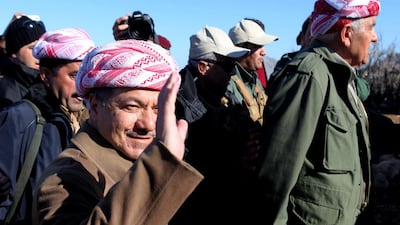MOUNT SINJAR, IRAQ // A triumphant Iraqi Kurdish leader saluted his victorious peshmerga fighters on newly recaptured Mount Sinjar on Sunday and vowed to crush ISIL.
“We will not leave an inch of the land of Kurdistan for ISIL, and we will strike ISIL in any place it is located,” Massoud Barzani, president of the self-ruled northern Kurdish region, told troops.
Thousands of peshmerga fighters backed by US-led coalition airstrikes launched a major operation on Wednesday that broke ISIL’s second siege of Mount Sinjar this year.
They cemented their gains on Sunday by pushing into the town of Sinjar, the district’s main settlement to the south of the mountain.
“During the past 48 hours, the peshmerga opened two main routes to Mount Sinjar,” said Mr Barzani. “We did not expect to achieve all these victories.”
The Kurdish offensive threatens the links between the city of Mosul, the main ISIL stronghold in Iraq, and territory the militant group controls in Syria.
The battle for Sinjar and the surrounding area has become the latest focus in the campaign to take back territory lost to the ISIL during the militants’ summer blitz that captured large swaths of northern and western Iraq and Syria.
There were loud explosions and intense gunbattles inside the town on Sunday as coalition aircraft bombed ISIL targets. At least 15 wounded Kurdish fighters were brought from the front lines to a makeshift clinic on the mountain.
Peshmerga spokesman Jabbar Yawar said they were still facing resistance from pockets of ISIL militants inside the town and that it was “far from cleared”.
Meanwhile, Iraq’s prime minister Haider Al Abadi travelled to Kuwait yesterday for talks expected to focus on the security situation.
The visit came just days after the UN said Iraq could delay payment of a final US$4.6 billion in war reparations for its 1990 invasion of Kuwait because of the “extraordinarily difficult security circumstances”.
ISIL spearheaded a sweeping offensive that has overrun much of Iraq’s Sunni Arab heartland since June, presenting both an opportunity for territorial expansion and a threat to the country’s Kurdish region.
The Iraqi military collapsed in the early days of the advance, clearing the way for the Kurds to take control of a swath of disputed northern territory that they have long wanted to incorporate into their autonomous region, over Baghdad’s objections.
But after driving south towards Baghdad, ISIL turned its attention to the Kurds in August, pushing them back towards their regional capital, Erbil.
Tens of thousands of members of the Yazidi religious minority were trapped on the mountain for days in the searing summer heat in the first ISIL siege, which sparked fears of genocide and prompted the US to begin airstrikes against the militants.
That siege was broken and many of the civilians rescued, but others stayed behind and were again besieged by the militant group in October.
Backed by the strikes, which are now being carried out by a coalition of countries including the UAE, Kurdish forces have now clawed back significant ground from ISIL.
The conflict seems set to redraw the internal boundaries of Iraq in favour of broader Kurdish control in the north.
While both Kurdish and federal forces have made gains against ISIL, the group remains a threat, holding extensive territory in Iraq and eastern Syria.
ISIL militants launched a major assault on the strategic town of Baiji, south of Mosul, on Saturday sparking fighting that lasted into the following day.
The province’s governor and an army officer said the attack was repulsed, and two other officers said that pro-government forces lost ground.
Mr Barzani said on Sunday the peshmerga might participate in an operation to retake Mosul itself, which is expected to take place next year.
“We will take part if the Iraqi government asks us, and of course we will have our conditions,” he said.
* Agence France-Presse and Associated Press

